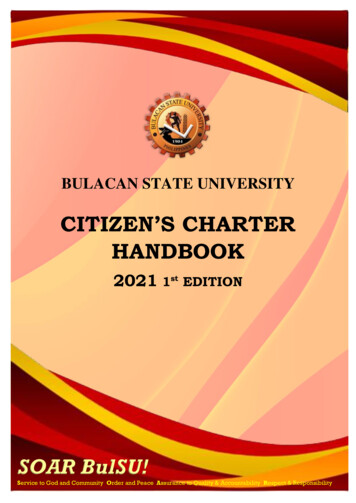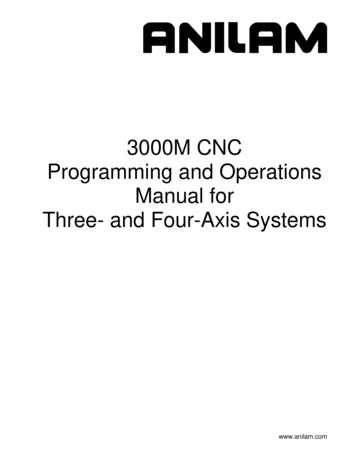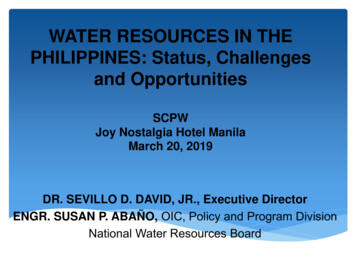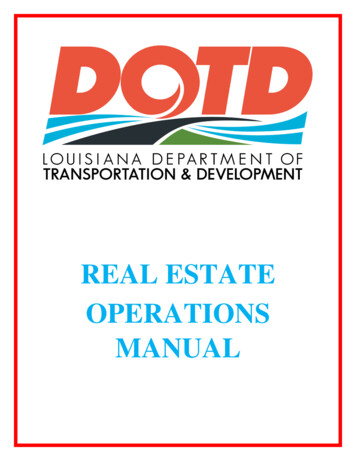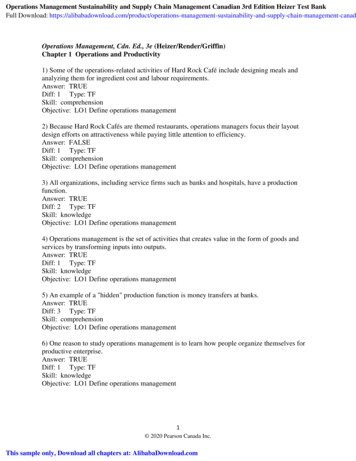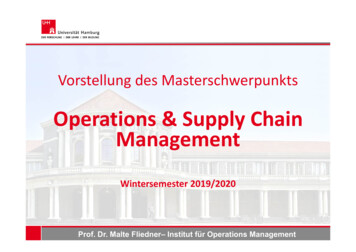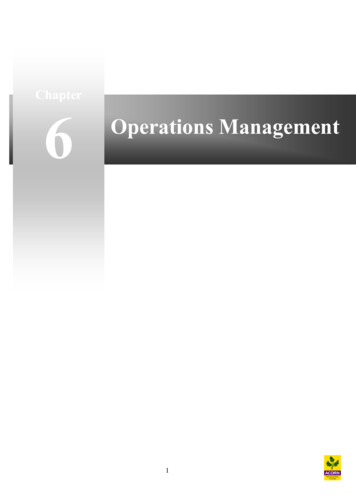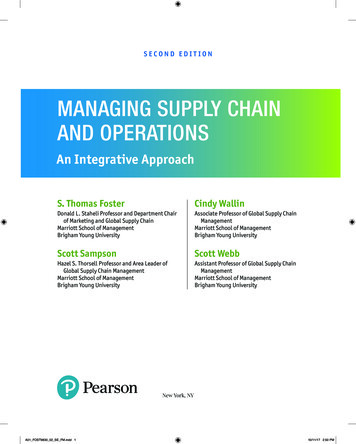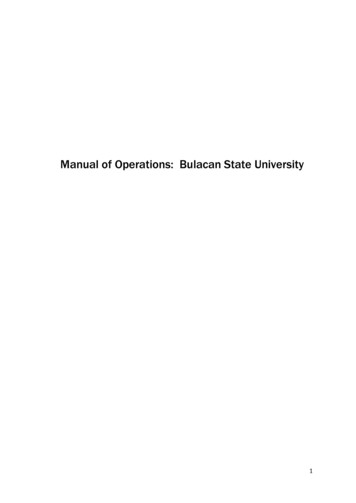
Transcription
Manual of Operations: Bulacan State University1
Table of ContentsIntroductionTermsGeneral InformationOfficial and Organizational ChartOperational Control and Supervisionand Procedures: Academic AffairsAcademic PolicyAdmission RequirementsGrading SystemStudent Affair Services and DevelopmentStudent OrganizationsStudent PublicationsStudent Conduct and DisciplineDisciplinary ProceedingsStudent GrievanceOperational Control, Supervisionand Procedures: FacultyResponsibilities of FacultyGeneral and Professional RegulationsAdministrative and Supervisory PoliciesGradesEmployment ConditionsAcademic RankFaculty SalaryBenefits and PrivilegesOperational Control, Supervisionand Procedures: ResearchOperational Control, Supervisionand Procedures: 659652
I IntroductionThis compendium of existing guidelines, policies and procedures serve to guidethe operations of Bulacan State University. They are a product of guidelines anddirectives of the various educational and fiscal regulatory bodies of the state. Theyare also informed and instructed by various relevant national legislations. Theseoperational guidelines also incorporate the various policies, directives andinstruction formulated by the local authorities of the university beginning with theBoard of Regents, the Administrative Council, the Council of Deans, AcademicCouncil and various local bodies clothed with authority to formulate and implementoperational policies.To some degree, the operational guidelines evolve through time to take intoaccount the wisdom borne of experience and the adaptive measures taken wherelogic and common sense dictate what is in the best interest of society and the veryclientele that the institutions is mandated to serve.II. Terms and Acronymsfollows:The terms and acronyms used in this Manual of Operations are defined asAdviser is a faculty member or non-academic personnel of the University designatedto provide motivation and guidance to the officers and members of a recognizedstudent organization in accordance to established rules and regulations of theUniversity.Academic Council. The University Academic Council consisting of the UniversityPresident as Chairman and all members of instructional staff with the rank of notlower than assistant professor as members, has the power to review and recommendcurricular offerings and rules of discipline of the University for appropriate action ofthe Board of Regents and fix the requirements for admission of students as well as forgraduation and conferment of degrees, subject to review and/or approval of theBoard of Regents through the President of the UniversityAdministrative Council. The University Administrative Council consisting of theUniversity President as chairman, the Executive Vice President, the Vice Presidents,Deans, Campus Administrators, Directors and other officials of equal rank asmembers, has the duty to review and recommend to the Board of Regents policiesgoverning the administration, management and development planning of theuniversity for appropriate actionBOR means Board of RegentsBulSU, BSU refers to Bulacan State University3
Member of the academic community refers to any person who is a student, facultymember, University official, or any other person employed by the University.OSO means Office of Student OrganizationsPresident means the President of the Bulacan State UniversityRA means Republic ActRecognition refers to the authority granted to student organizations to operate in theBulacan State UniversityRecognized Students Organization is any organized group of University studentspursuing common interests and goals and granted recognition by the University.Student refers to any person enrolled in the University, either full-time or part-timeUniversity Administration refers to the governance system of the Universityincluding the Board of Regents, the President, and the University councilsUniversity employee includes any person employed by the University, performingassigned administrative, professional responsibilities, including staff,paraprofessionals, maintenance and security personnelUniversity means the Bulacan State University covering all of its campusesUniversity campuses and premises refers to all lands, buildings, facilities, and otherproperty in the possession of or owned, used, or controlled by the Universityincluding adjacent streets and sidewalks.III. General InformationA. The UniversityShaping the Landscape of Excellence in Educational LeadershipBulacan State University took no shortcuts in becoming what it is today. From itsinception as an intermediate school in 1904 to a trade school during the commonwealthperiod to a college of arts and eventually, a state university in 1993, the school adapted tothe exigencies of the times without for once losing sight of its primordial mission ofadding qualitative and vocational value to the lives of the people in its service sphere.The legislative mandate of Bulacan State University - R.A. 7665 - empowers it tooffer courses and programs in the entire gamut of human endeavors. The University ismandated to provide higher professional/ technical and special instruction for specialpurposes and to promote research and extension services, advanced studies andprogressive leadership in Engineering, Architecture, Education, Arts and Science, Fine Arts,Information Technology, Technical courses, Commerce, Agriculture, Forestry, Medicine, Law,Public Administration, Fishery, Leather Technology and other courses as circumstancewarrants. The University offers degree programs in the fields of Engineering, IndustrialTechnology, Arts and Sciences, Education, Architecture, Fine Arts and Computer4
Education. After strengthening its basic offerings in the fields of engineering, industrialtechnology, education, architecture and a host of disciplines in technology and serviceindustries, the institution embarked on new programs to further push the frontiers of itsservice field. The academic landscape now includes such diverse fields as law, nursing,legal management, business administration and criminology. The Bachelor of Lawsprogram was hailed as “innovative” by the Commission on Higher Education as it wasconceived in partnership with local Integrated Bar Association and is run withoutadditional cost burden on the government.The Bulacan State University is committed to the advancement of the knowledge andvalues common to all educated persons. Excellence in instruction, research, extension,and student life is encouraged. The University strives to offer learning experiences andopportunities designed to help students think effectively, develop the capacity tocommunicate, discriminate among values, and make relevant judgments.All members of the University community share in the responsibility for providing andmaintaining an environment conducive to the educational development of the students atthe University. The University, through its established governance process, createspolicies and procedures that help maintain this environment.Institutional PhilosophyThe guiding philosophy of the BSU is contained in its statements of vision, missionand goals. In support of the national agenda for higher education articulated by theCommission on Higher Education, the University, as a state institution, pursues thefollowing vision, mission and goals.VisionA recognized leader of excellence in instruction, research and extension services, a keyplayer in the education and formation of professionally competent, service-oriented, andproductive citizens, and a prime mover of the nation's sustainable socioeconomic growthand development.MissionIt is the University’s mission to provide higher professional, technical, and specialinstruction for special purposes, and promote research and extension services, advancedstudies and progressive leadership in agriculture, commerce, education, fishery, forestry,engineering, arts and sciences, law, medicine, public administration, industrial technologyand other fields as may be relevant (Sec. 2, R.A. 7665).GoalsIn the pursuit of its mission, the University gears its initiatives and efforts towardsattainment of the following goals:1. Quality and Excellence - the provision of undergraduate and graduate educationthat meets international standards of quality and excellence;2. Relevance and Responsiveness - generation and diffusion of knowledge in the broadrange of disciplines relevant and responsive to the dynamically changing domesticand international environment;5
3. Access and Equity - broadening the access of deserving and qualified Filipinos tohigher education opportunities; and4. Efficiency and Effectiveness - the optimization of social, institutional, andindividual returns from the utilization of higher education resources.IV. Officials and their Duties and Organizational Chart of theUniversityThe governance of the university is guided by the provisions of Republic Act 8292 ,known as the Higher Education Modernization Act of 1997. The law outlines the uniformcomposition and powers of governing boards, and the manner of appointment and termof office of the president of chartered state universities and colleges.The governing body, which is the Board of Regents for the state universities and colleges(SUC) and Board of Trustees for colleges, shall be composed of the following: Chairman of the Commission on Higher Education as chairmanPresident of the university or college as vice chairmanChairmen of the Congressional Committees on Education and CultureRegional director of the National Economic Development Authority (NEDA) where themain campus of the university or college is locatedRegional director of the Department of Science and Technology (DOST) for science andtechnological colleges; or the regional director of the Department of Agriculture foragriculture colleges; or the secretary of Education for an Autonomous Region. In line withsuch representation, the commanding generals of the Philippine Air Force and thePhilippine Navy shall sit as members of the Board of Philippine State College ofAeronautics and the Philippine Merchant Marine Academy, respectively.President or representative of the faculty association (faculty regent)President of the supreme student council or the student representative elected by thestudent council (student regent)President or representative of the alumni association of the concerned institution (alumniregent)Two (2) prominent citizens who have distinguished themselves in their professions orfields of specialization. They would be chosen among the list of at least five (5) personsqualified in the city or province where the school is located as recommended by thepresident with consultation of the chairman of CHED based on the normal standards andqualifications for the position.The faculty and student council will have their respective representative in the Board ofRegents. The private sector representatives shall be appointed by the Board of Regentsupon the recommendation of a duly constituted search committee.Officials of the University.The officials of the university are thoseappointed/designated to the different offices specified in the organizational structureapproved by the Board of Regents.President. The University shall be headed by a president to be appointed by the Board ofRegents in accordance with the pertinent provisions of R.A. 8292.The powers and duties of the President as Chief Executive of the University shall be inaccordance with the provisions of R.A. 7665 and R.A. 8292. The President shall have theauthority to designate other university officials and create such other offices as the needarises, subject to approval of the Board of Regents.6
1.To provide leadership for the university, to preserve and protect its academic integrity andensure the observance and implementation of the policies laid down by the Board of Regents;2. To exercise within the framework of university policies primary authority and responsibilityover the following areas: development planning and resources allocations; grants;endowments and fund raising; external relations and public affairs; and university policiesrelating to regional development programs, curricula and matters affecting the rights,privileges, responsibilities and welfare of the university constituency;3. To formulate integrated and comprehensive plans for the university including academic,research, extension, physical development and fiscal plans;4. To coordinate the activities and programs of the university with the other component unitsand instructions, appraise their performance in relation to goals and recommend appropriateaction to the Board of Regents;5. To recommend officers, faculty members and other employees in the University subject toSection 8 of this Act and to designate vice presidents, deans, directors, heads ofdepartment/offices, or officer-in-charge of the units therein;6. To appoint, transfer or promote personnel of the University as herein below provided; fixtheir work schedules; grant leave of absence; approve their special detail, additionalassignments, additional compensation, resignation and retirement in accordance with thepolicies approved by the Board of Regents;7. To set up a machinery for the review of all disciplinary actions appealable to the office of thepresident and for the consideration of petitions of redress/grievances;8. To submit to the Board of Regents the courses of study and academic programs, rules ofdiscipline and awards of degrees and diplomas as recommended by the University councils;9. To award fellowships, assistance and scholarship to students, faculty members and otherpersonnel in accordance with the policies prescribed by the Board of Regents;10. To plan, prepare and implement a university program for the training and education of adultcitizens and out-of-school youths;11. To negotiate and obtain grants for specific projects, gifts and donations of real and personalproperty of all kinds subject to the confirmation of the Board of Regents, and to administerthe same for the benefit of the university, its units, departments, or students in accordancewith the directions and instructions of the donor, and in default thereof, in such manner asthe board of regents may, in its discretion, determine;12. To maintain linkages with other academic and research institutions to ensure fruitfulacademic and technical interchange and maximize the use of human and physical resources;13. To prepare for approval of the Board of Regents, the annual budget of the university;14. To submit to the Board of Regents annual reports on the operation of the university, suchother reports as latter may require under this Act;15. To exercise such other powers and discharge such other responsibilities as may be delegatedto him by the Board of Regents provided that he shall institute a system for the efficientdischarge of his administrative responsibilities; and16. Presides over the meetings of the administrative and academic councils.The President shall have the authority to designate other university officials and create such otheroffices as the need arises, subject to the approval of the Board of Regents.Vice President for Academic Affairs. The Vice President for Academic Affairs shall havethe following functions:1. Reports to and receives orders from the University President and the Executive VicePresident on matters related to academic affairs;2. Assists the University President and the Executive Vice President in implementingoffice orders, memoranda and other circulars on academic matters;3. Implements approved academic plans, programs and projects;4. Reviews and integrates operational plans of the various academic units;5. Participates in the overall planning and major decision making processes in theuniversity;7
6. Reviews academic programs, makes recommendations for appropriate revisions andintroduces new development on curricular matters;7. Coordinates and oversees the administration of the academic units on programplanning, implementation, monitoring, and evaluation;8. Supervises all academic personnel and exercises authority to institute appropriatedisciplinary measures as warranted;9. Coordinates with other Vice Presidents on matters affecting academic affairs;10. Liaises and establishes functional linkages with other institutions and organizationson curricular and co-curricular matters;11. Performs other functions as may be assigned by higher authorities.Vice President for Administration and Finance. The Vice President for Administrationand Finance shall be directly responsible for administrative and financial operations ofthe university. He/she shall have the following functions:1. Reports to and receives orders from the University President and the Executive VicePresident on matters related to administrative and financial matters;2. Assists the University President and the Executive Vice President in implementingoffice orders, memoranda and other circulars administrative and financial matters;3. Implements approved administrative and financial plans, programs and projects;4. Reviews and integrates operational plans of the various administrative and financialunits;5. Participates in the overall planning and major decision making processes in theuniversity;6. Reviews administrative programs and financial status, makes recommendations forappropriate revisions and introduces development on administration and financematters;7. Coordinates and oversees the administration of the non-academic units on programplanning, implementation, monitoring, and evaluation;8. Supervises all non-academic personnel and exercises authority to institute appropriatedisciplinary measures as warranted;9. Coordinates with other vice presidents on matters affecting administrative andfinancial matters;10. Liaises and establishes functional linkages with other institutions and organizationson administrative and financial matters;11. Performs other functions as may be assigned by higher authorities.Vice President for Planning, Research and Extension. The Vice President for Planning,Research and Extension shall be directly responsible for the formulation of developmentplans and the direction of research and extension programs of the university. He/sheshall have the following functions:1. Reports to and receives orders from the University President and the Executive VicePresident on matters related to planning, research and extension programs;2. Assists the University President and the Executive Vice President in implementingoffice orders, memoranda and other circulars on matters related to the functions of theoffice;3. Implements approved plans, programs and projects;4. Reviews and coordinates the research and extension activities of the various academicunits;5. Participates in the overall planning and major decision making processes in theuniversity;8
6. Reviews research and extension programs, makes recommendations for appropriaterevisions and introduces development in planning, research and extension matters;7. Coordinates and oversees the administration of the research and extension units onprogram planning, implementation, monitoring, and evaluation;8. Supervises all planning, research and extension personnel and exercises authority toinstitute appropriate disciplinary measures as warranted;9. Coordinates with other vice presidents on matters affecting planning, extension andresearch matters;10. Liaises and establishes functional linkages with other institutions and organizationson matters pertaining to planning, research and extension;11. Performs other functions as may be assigned by higher authorities.9
Board of RegentsBoard/University SecretaryCommission on AuditPresidentAdministrative CouncilResidentOmbudsmanInternal Unit/ControlServiceAcademic CouncilResearch CouncilCenter for Learning and Innovation for ProfessionalsSentro ng Edukasyon para sa Ekonomiya at KalikasanCultural Dev’t CouncilPangrehiyong Sentro ng Wikang FilipinoSports Dev’t CouncilCultural Affairs and Performing ArtsVice-President forAdministration &FinanceDirectorAuxiliary ServicesManagerFood ServicesManagerBusiness CenterManagerDormitory/HostelDirectorFinance ServicesAccountantBudget OfficerCashierVice-President forPlanning, Researchand ExtensionVice- President forAcademic AffairsDirectorAdministrativeServicesHuman ResourceManagementOfficerSupply OfficerRecords OfficerMedical OfficerDirectorGeneral ServicesBulacan State University –Organizational Chart as approved by BORDeanCollege ofEducationDeanCollege of IndustrialTechnologyDeanGraduate SchoolDeanCollege of LawDeanCollege ofEngineeringDeanCollege ofScienceDeanCollege of Arts &LettersDeanCollege of SocialScience &PhilosophyDeanCollege of HomeEconomicsDeanCollege of Architectureand Fine ArtsDeanCollege of Information andCommunication TechnologyDeanCollege ofNursingDeanCollege of PhysicalEducation Recreationand SportsDeanCollege of BusinessAdministrationDeanCollege of CriminalJustice EducationDeanStudentAffairsAdministratorBustos CampusAdministratorSarmiento CampusAdministratorMeneses CampusAdministratorHagonoy CampusDirectorNational ServiceTraining ProgramDirectorInternal rGuidanceDirectorScholarship &Financial ntPublicationUniversityLibrarianVice-President forExternal alAffairsDirectorCenter forBulacan StudiesDirectorExtensionServicesDirectorAlumni AffairsDirectorConfuciusInstituteDirectorPlanning &DevelopmentServicesDirectorPublic EmploymentService rojectManagementChiefSecurity ServicesPer BOR Resolution #9 s. 201210
V. Operational Control and Supervision and Procedures: AcademicAffairsPart 1 Academic PolicyBy formulating policies, rules and regulations on student conduct, theUniversity affirms the principle of student freedom that is coupled with an acceptanceof full responsibility for individual actions and the consequences of such actions.A. Policy StatementsThe Bulacan State University recognizes that the student is the central figure in all itseducational programs, projects and activities, and that his/her self-realization possiblethrough formal education is the measure of the attainment of the institutional goals. TheUniversity likewise realizes the importance of the student’s participation and cooperationin the establishment and maintenance of a healthy and peaceful campus environmentconducive to the efficient and effective attainment of educational objectives. Hence, withinthe atmosphere of unity of purpose and commitment to shared responsibilities, theUniversity adheres to the following policies:The University shall promote and protect the physical, intellectual, moral, spiritual, andsocial well-being of the students.a. The University shall respect the individual and collective rights of students asprovided for by law, public policy, and generally accepted customs and traditions.b. The University shall guarantee the right to quality education of all students and shallact appropriately to make such education accessible.c. The University shall not discriminate against any student regardless of sex, socioeconomic status, political beliefs, religion, and aspirations.d. The University shall support students’ initiatives and provide for their participationin matters affecting their interest and well-being.B. Classification of StudentsStudents in the University are classified as follows:a. A regular student is one who registers for formal academic credits and who carries the fullload for a given semester and curriculum.b. An irregular student is one who registered for formal credits but who carries less than thefull load for a given semester to complete the requirements of the given curriculum.c. A shifter student is one who enrolls from one course to another within the same or anothercollege of the University.d. A transfer student is one who had come from another recognized institution of higherlearning and officially allowed to enroll to the same or another course in the University.e. A working student has part time job while studying. A working student may be allowed toenroll a minimum of fifteen (15) academic units in a given term or semester.f. A foreign student is one who is not a citizen of the Philippines.g. A special student is one who is not earning credits for his academic work. Special studentmay enroll a maximum of nine (9) units per semester. He may enroll for a maximum two(2) academic years. The unit head concerned may recommend exemption to thislimitation, subject to the approval by the Vice President for Academic Affairs. Specialstudent’s academic performance shall be marked “satisfactory or unsatisfactory.”C. Student’s Rights, Obligations and ResponsibilitiesThe Bulacan State University strives to maintain an educational environment thatsupports the academic, professional, and personal development of all members of thecommunity where relationships among students, faculty, and staff are marked by mutualrespect and appreciation for each other's rights and responsibilities.11
The University recognizes the rights of its students guaranteed by the Constitution ofthe Philippines and the Education Act of 1982.a. Rights under the Education Act of 19821. The right to receive primarily through competent instruction relevant quality2.3.4.5.6.7.8.9.10.education in line with national goals and conducive to full development as personswith human dignity;The right to freely choose their field of study and to continue their course therein upto graduation except in case of academic deficiency or violation of disciplinaryregulations;The right to school guidance and counseling services for making decisions andselecting the alternatives of work suited to his potentialities;The right to access to his own school records, the confidentiality of which the schoolshall maintain and preserve;The right to the issuance of official certificates, diplomas, transcript of records,transfer credentials and other similar documents within 30 days from request;The right to publish a student newspaper and similar publications, as well as theright to invite resource persons during convocation, symposium and other activitiesof similar nature;The right to free expression of opinions and suggestions, and to effective channels ofcommunication with appropriate academic and administrative bodies of the schoolinstitution;The right to form, establish, join and participate in organizations and societiesrecognized by the school to foster their intellectual, cultural, spiritual, and physicalgrowth and development, or to form, establish, join and maintain organizations andsocieties for purposes not contrary to law;The right to participate in the formulation and development of policies affecting theschool through representation in the appropriate body/bodies of the school to bedetermined by the Governing Board;The right to be free from involuntary contributions, except those approved by theirown organizations or societies.b. ObligationsAll bonafide students of the University shall be covered by all obligations ascitizens mandated in the constitution and those stated under the Education Act of1982 as follows:1. To render personal military or civic service under the conditions provided for by2.3.4.5.6.7.law;To develop patriotism and nationalism, love of humanity, respect for human rightsand appreciation of the role of national heroes in the historical development of thecountry;To understand the rights and accept the duties of citizenship, strengthen his ethicaland spiritual values, develop moral character and personal discipline, critical andcreative thinking;To exert his utmost to develop his potentialities for service, particularly, by pursuingan education suited to his abilities, in order that he may become an asset to his familyand to society;To uphold the academic integrity of the school, endeavor to achieve excellence andabide by the rules and regulations governing his academic responsibilities and moralintegrity;To promote and maintain the peace and tranquility of the school by observing therules of discipline, and by exerting efforts to attain harmonious relationships withfellow students, the teaching and academic staff and other personnel;To participate actively in civil affairs and in the promotion of the general welfare,particularly in the social, economic and cultural development of his community and inthe attainment of a just, compassionate and orderly society;12
8. To exercise his rights responsibly in the knowledge that he is answerable for anyinfringement or violation of the public welfare and the rights of others;9. To strive to lead an upright, virtuous and useful life;10. To love, respect and obey his parents, and cooperate with them to maintain the familysolidarity;11. To respect the customs and traditions of our people, the duly constituted authorities,the laws of our country and the principles of democracy;12. To help in the observance and exercise of individual rights and strengthening offreedom in the pursuit of progress, prosperity and world peace.c. ResponsibilitiesStudents have responsibilities that they accept through membership in theUniversity’s learning community. Each student should approach academic endeavors,relationships, and personal responsibilities with a strong commitment to personalintegrity and mutual respect. As members of the academic community, students have thefollowing responsibilities:1. To be courteous, respectful, and orderly in their behavior inside and outside theUniversity, especially when they use the name of, or represent the University;2. To wear the University I.D. at all times within the campus;3. To wear the prescribed school uniform on days required or appropriate attire on free dayswithin the campus;4. Ma
The guiding philosophy of the BSU is contained in its statements of vision, mission and goals. In support of the national agenda for higher education articulated by the Commission on Higher Education, the University, as a state institution, pursues the following vision, mission and goals. Vision
